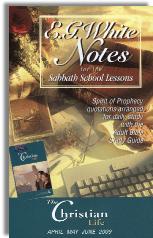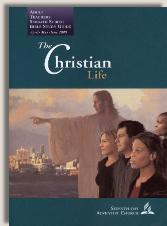|
||||||||||||||
Commentary on "Faith"
Day 7: Friday, April 10, 2009
Grace and the Centrality of Christ
How excellent to end a study on faith with an exhortation to "grow in grace and in the knowledge of our Lord and Savior Jesus Christ." As Paul wrote (and we began the week with this quote), "For by grace you have been saved through faith; and that not of yourselves, it is the gift of God; not as a result of works, so that no one may boast" (Ephesians 2:7-9). We are saved by God's grace, given to us through Jesus, and we are called to grow and be strengthened in that grace. The author of Hebrews writes:
Do not be carried away by varied and strange teachings; for it is good for the heart to be strengthened by grace, not by foods, through which those who were so occupied were not benefited. We have an altar from which those who serve the tabernacle have no right to eat (Hebrews 13:9-11).
The writer's main point is that "it is good for the heart to be strengthened by grace." Grace is the infinitely abundant, constantly flowing, freely given, completely undeserved and unearned favor of God in all things and at all times for those who trust in Him and believe in the name of His Son Jesus Christ. As we grow in the knowledge of God, we will be further enabled to trust in God's grace.
The writer counsels us not to be carried away by varied and strange teachings -- this means any vein of teaching that detracts or distracts from the grace of God in Jesus. A teaching is "varied and strange", and therefore to be avoided, if its root is in something other than Jesus. One example given in this passage of a varied and strange teaching is "foods." In context the writer is referring to the practice of food-related traditions in Judaism, and especially teachings that various dietary and eating rituals carried spiritual significance and spiritually benefited those who practiced them. Vegetarianism, dieting, and fasting are some examples of modern-day food practices that people often do for the sake of spiritual benefit. Paul clarifies what the real issue is with these things when he writes:
See to it that no one takes you captive through philosophy and empty deception, according to the tradition of men, according to the elementary principles of the world, rather than according to Christ (Colossians 2:8). The question to ask about any teaching or practice is whether it is rooted in the tradition of men and the elementary principles of this world, or whether it is rooted in Christ. In other words, are you looking to this teaching or practice to benefit you spiritually, or are you trusting Jesus alone for all your spiritual benefit?
To eat vegetarian, or diet, or fast, is not a sin per se, as Paul writes (and he includes Sabbath keeping here as well):
One man considers one day more sacred than another; another man considers every day alike. Each one should be fully convinced in his own mind. He who regards one day as special, does so to the Lord. He who eats meat, eats to the Lord, for he gives thanks to God. For none of us lives to himself alone and none of us dies to himself alone. If we live, we live to the Lord; and if we die, we die to the Lord. So, whether we live or die, we belong to the Lord (Romans 14:5-8).
In another place, Paul writes:
Therefore no one is to act as your judge in regard to food or drink or in respect to a festival or a new moon or a Sabbath day--things which are a mere shadow of what is to come; but the substance belongs to Christ (Colossians 2:16-17).
Jesus alone is the substance, the reality, the full and final revelation of the character of God, and the source of grace and truth. John writes:
For of His [the Word's, Jesus'] fullness we have all received, and grace upon grace. For the Law was given through Moses; grace and truth came through Jesus Christ. No one has seen God at any time; the only begotten God who is in the bosom of the Father, He has explained Him (John 1:16-18).
As opposed to the Law given through Moses, grace and truth came through Jesus Christ; furthermore, Jesus, not the Law or any strange teachings, is the full revelation of the invisible God to us. Therefore, as God the Father spoke out of the cloud over Jesus, "This is my Son, whom I love; with him I am well pleased; listen to Him!" (Matthew 17:5). Let us listen to Jesus and avoid strange teachings. Truth, grace, and eternal life are found in Him alone.
Comments on the discussion questions
1. The encouragement we can draw from these great men and women of faith is that righteousness before God, and even being listed among those whose lives brought glory to God, is not achieved by conformance to an external moral standard; righteousness is given to those who have faith in Jesus Christ, regardless of the sins they have committed.
2. The important thing, whether we are in a crisis of faith or not, is to love the truth and desire to live according to it. Some applicable promises are:
"Blessed are those who hunger and thirst for righteousness, for they shall be satisfied" (Matthew 5:5-7).
"If you continue in My word, then you are truly disciples of Mine; and you will know the truth, and the truth will make you free" (John 8:31-32).
"But when he, the Spirit of truth, comes, he will guide you into all truth" (John 16:13).
We can trust God and His word and the Holy Spirit to lead us to the truth. Ask Him: "Father, thank you for the truth of your Word, and thank you for the help of the Holy Spirit. Please guide me into all truth. Help me to know what is real. Give me wisdom. I need your help. I submit myself to You and to Your word, and I trust you to take care of me."
3. The truth, the reality of all things, can stand up to all challenges. Our faith is based on solid reality (for example, there are myriads of proof for the authenticity of scripture, for the resurrection, etc.). Apologetics resources exist to help people with intellectual challenges to their faith, and even better, God has promised to give wisdom to those who ask and who seek it. But we must be willing to submit ourselves to the truth when He reveals it.
4. The statement "you need faith to believe in what you can't prove" could be misleading -- it could seem to imply to someone that we can prove some things completely. But in reality, we can't prove anything completely: there will always be assumptions upon which other things are built. For example, most of us assume without requiring proof that what we see with our eyes does exist. Such beliefs can be supported by other evidence, but there is no level of evidence that can force someone to believe.
We must submit ourselves and obey what we know is true. Knowledge of truth comes by obedience, not by reasoning. Oswald Chambers writes that we learn more in five minutes of obedience than a year of reasoning. Jesus said:
If anyone chooses to do God's will, he will find out whether my teaching comes from God or whether I speak on my own (John 7:17).
May God guide you into all truth as you listen to Jesus and obey His word. His yoke, not the law, but the grace and truth of God, is easy; His burden is light.
Summary
- It is good for our hearts to be strengthened by grace, not by strange teachings -- anything that detracts or distracts from the centrality of Christ.
- Grace and truth come through Jesus Christ, not the Law, and not through empty, external actions and practices
- Righteousness before God is by faith alone -- this is the greatest encouragement of Hebrews 11
- In crises of faith, the truth is precious. Ask God to lead you to the truth, and humbly submit yourself to Him.
- All realization of truth comes by obedience, not by reason. Listen to Jesus and obey, and you will know the truth, and the truth will set you free.
Copyright 2008 BibleStudiesForAdventists.com. All rights reserved. Revised April 12, 2009. This website is published by Life Assurance Ministries, Glendale, Arizona, USA, the publisher of Proclamation! Magazine. Contact email: BibleStudiesForAdventists@gmail.com.
The Sabbath School Bible Study Guide and the corresponding E.G. White Notes are published by Pacific Press Publishing Association, which is owned and operated by the Seventh-day Adventist church. The current quarter's editions are pictured above.
Official Adventist Resources
Standard Edition Study Guide Week 2
Teacher's Edition Study Guide Week 2


